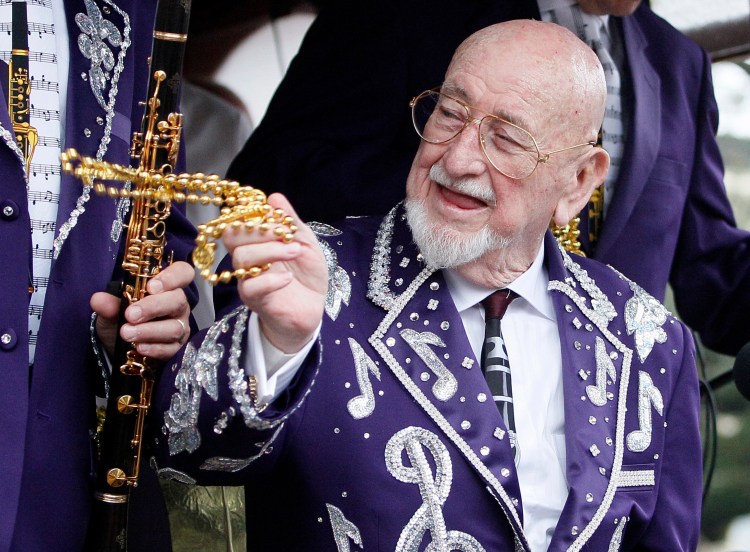Pete Fountain, whose rousing performances on clarinet made him a star of Dixieland music, a familiar figure on television and in nightclubs, and one of the most popular musical ambassadors of his native New Orleans, died Aug. 6 in his hometown. He was 86.
His son-in-law and manager, Benny Harrell, announced his death. The immediate cause was not disclosed, but Fountain, who was in hospice care, had heart surgery and strokes in recent years.
From 1957 to 1959, when Fountain was a standout soloist on “The Lawrence Welk Show,” he was perhaps the most widely recognized jazz musician on TV. He developed his musical style as a teenager while playing in Bourbon Street clubs – which he called his “conservatory” – and seemed to have every old-time Dixieland and gospel tune at his fingertips.
His recording of the hymn “Just a Closer Walk With Thee” sold 500,000 copies when it was released in 1959, and several of his nearly 100 albums became gold records.
Known for his shaved head, goatee and dapper wardrobe, Fountain was as effervescent as his music. For years, he owned Crescent City nightclubs in which he held court as the bandleader, featured performer and raconteur.
Few musicians, with the possible exceptions of trumpeter Al Hirt and the members of the Preservation Hall Jazz Band, were so deeply identified with the early music of New Orleans, the birthplace of jazz.
He appeared nearly 40 times at the New Orleans Jazz and Heritage Festival and was a guest on Johnny Carson’s “Tonight Show” more than 50 times. He performed at five White House state dinners and before Pope John Paul II during a 1987 papal visit to New Orleans.
“It snuck up on me,” Fountain said of his fame in 2002. “I didn’t look for it. I never did strive for anything. Through the years I just wanted to play.”
He stayed true to the classic music of his home town, and his versions of such tunes as “Basin Street Blues,” “Clarinet Marmalade” and “Tin Roof Blues” are considered authoritative.
“I never had any interest in going the improv route,” he told New Orleans CityBusiness. “I was just enjoying what I was doing too much. I didn’t want to progress in the progression of progressive jazz. I just like to hear the melody too much and know where I’m at.”
Pierre Dewey LaFontaine Jr. was born July 3, 1930, in New Orleans. His father, who drove a beer truck and was a part-time musician, changed the family name.
Fountain began to play clarinet at the urging of a doctor, who said it would help build his lung capacity. He began performing in nightclubs at 15, alongside many of the founders of New Orleans jazz.
When one of his high school teachers reprimanded him for sleeping in class, Fountain explained that he was working nights on Bourbon Street. The teacher asked how much he made: Fountain said he took home $150 a week.
“He said, ‘I don’t make that – go turn in your book,’ ” Fountain recalled to the New Orleans Times-Picayune in 1997. “He wrote my mother a note saying, ‘Let this boy get some sleep so he can work at night.’ ”
His musical approach blended the jazzy swing of Benny Goodman and the rich tone of New Orleans clarinet master Irving Fazola. Fountain performed with Hirt, the Dukes of Dixieland and other groups before catching on in 1957 with Welk, a bandleader who had a popular television show at the time.
Fountain, who enjoyed a good time, had difficulty adhering to Welk’s rules against drinking on the job.
“He kept me sober – damn near killed me,” Fountain said. Once, when Welk learned that Fountain had been drinking before a performance, he featured him in five consecutive songs.
“He put me in the front, and made me play one after the other, waiting for me to make a mistake,” Fountain told the Times-Picayune. “The more I played, the hotter I got. So he finally backed off.”
After two years with Welk in California, Fountain returned to New Orleans. He opened a club on Bourbon Street in 1959 and later headlined at a jazz room at the Hilton New Orleans Riverside until 2003.
Fountain became wealthy from his appearances and recordings, but he admittedly made bad investments in hotels, hot-dog franchises and other dubious business propositions. He spent lavishly on an antique car collection.
“I think, really, God said, ‘I’m going to give you this gift and you’re going to play the clarinet,’ ” he said in 2002. ” ‘And every time you think you’re going to do something else, I’m going to zap you.’ ”
In 2005, Fountain’s home in Bay St. Louis, Mississippi, was destroyed by Hurricane Katrina. A second home in New Orleans was largely untouched by the storm.
His final public performance came in 2013 at the New Orleans Jazz and Heritage Festival.
Survivors include his wife of 64 years, the former Beverly Lang; three children; six grandchildren; and five great-grandchildren.
For years, Fountain wore toupees to cover his bald pate. He finally gave up the idea one night in Las Vegas, when he dramatically tore off his hairpiece on the bandstand.
“I got two or three toupees made a year,” he said in 1990. “Each time the hair was a little longer. It got down over my shoulder. I finally realized, what the hell am I trying to do? You can’t keep up with these kids. So that night in Vegas I got rid of it. It was soaking wet with sweat. It was like wearing a mop on your head.”
Send questions/comments to the editors.



Comments are no longer available on this story